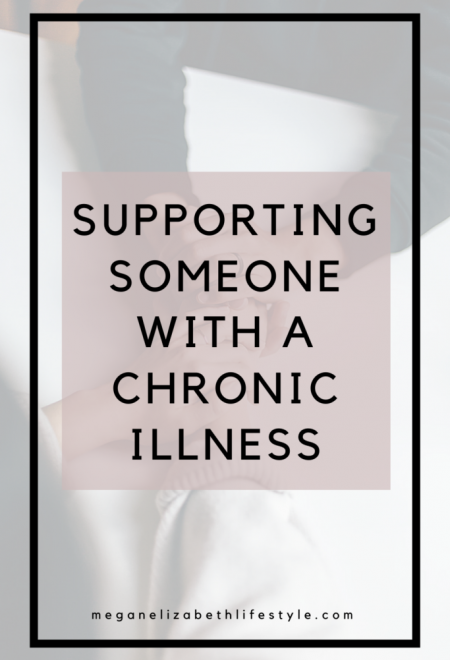How to Support Someone with a Chronic Illness

When you have a friend or family member living with a chronic illness, it is hard to know how to provide support. Even more so if you don’t have first-hand experience of their illness or what they’re going through. You feel more able to empathise with someone when you have an in-depth understanding of their situation because you have gone through the same thing. When somebody has a cold, for instance, or on a tougher note, when someone loses a loved one. We know the ‘appropriate’ ways to react in those moments because more often than not, you will know the feeling at some point in your life.
With long-term health conditions, you don’t always have that shared experience. That lack of relatability means it is difficult to know what to do when someone close to you is chronically ill. I also find that a lot of social media awareness tells you what NOT to say or do when someone has a chronic illness, rather than talking about what you CAN do.
There are many ways to support someone with a chronic illness. Simply being there and providing a supportive presence makes a huge difference.
Disclaimer: Chronic illness is a very personal subject. The content in this post is based on my experience with chronic illness. They are things which I believe to be beneficial forms of support. This may not be the case for everyone with a chronic illness though.
Believe that person
You may think this sounds silly, but it is something that still remains an issue. Many chronic illnesses appear invisible. This does not mean they are not real or that someone isn’t suffering. It just means that their health condition may affect their insides (such as IBD) and you can’t visibly see their illness.
Get to know their condition
Take the time to research and educate yourself on your friend’s illness. If that particular condition has a charity linked to it, that can be a reliable place to find information and understand the symptoms, treatments, and impact on life that having a chronic illness can bring. Organisations such as Crohn’s and Colitis UK have specific information on how to support someone with the condition.
You may think “Why can’t I just ask my friend or relative what their chronic illness is?”
In my experience, I often have to repeat my medical history in hospital appointments, as well as having to live with my chronic illness on a daily basis. Having to go over that information again to people close to me can be draining and quite traumatic, and I always feel a sense of relief if someone already knows what Crohn’s is and what it involves.
Listen before sharing your thoughts
This is one of the most important things for me. Having people in my life who listen.
Being an active listener not only allows your loved one to get anything off their chest, but also gives you a better understanding of how they are feeling. At the same time, never put pressure on someone to talk. Let them know that you are there and ready to listen, but never force a conversation that someone isn’t ready to have.
Part of listening and educating yourself on someone’s chronic illness is so that you can reflect on what they have said and what you have learnt before suggesting your thoughts. Thinking before you speak is relevant here.
I’ve had moments when people have said to me “I understand how you are feeling because of this” or “Have you tried this thing?”. It’s like comparing IBS and IBD which are two very different conditions. Things are well-intentioned (which is really appreciated), but in actual fact they come across wrongly. This isn’t something to feel guilty about, as we learn from those words which perhaps weren’t the best. It’s something to be mindful of though, and that’s why listening matters.
Be flexible
Many chronic illnesses and how you feel can fluctuate on a daily or even hourly basis. This means not being able to plan things in advance or do certain things.
If someone has to cancel or rearrange plans, be mindful that it’s not because they don’t want to spend time with you or go out, but it’s because they physically can’t because of their health. If you feel bad after one plan in cancelled, imagine how they for constantly having to live like that.
Also offer alternative ideas of how you could spend time together. It could be that your friend or family member isn’t up to a full blown trip out, but a quiet movie night in would be ideal. Get creative and keep a range of activities in mind that are suitable for lower energy days. After all, flexibility, spontaneity, and living in the moment are, I think, positive ways to live regardless.
Have regular check ins
Having a chronic illness can be very isolating – lockdown has highlighted this. Have regular check ins, whether that be a phone call, message, video chat. Having that social interaction is so important and there are times when chronic illness can take that away from you.
Practical forms of support
All of these forms of support are in a sense practical. Are there things though which you could help with on a day-to-day basis such as seeing if a friend needs anything from the shops? During lockdown it’s a bit harder, but when (hopefully in the not so distant future) we can see each other again, things like giving loved ones lifts to appointments or seeing if there’s anything errands that need doing can be a real help.
Chronic illness does impact a person, but there is more to them than their illness – be a source of positivity
Receiving a chronic illness diagnosis and living with a lifelong health condition affects you. It would be weird if it didn’t.
But chronic illness isn’t the only part of life.
If your loved one wants to talk about their health, then let them take the lead and know that that’s ok.
Likewise, remember that there is more to life than their illness and there is so much more to life. Remember that a person is not their illness, but they are still human and still them.
Your relationship with your loved one should still be about positivity, fun, and hope just as it has always been. You can still have a laugh, do enjoyable things, and have a good gossip. Those kind of things can really be a beacon of light with a chronic illness and provide a real boost.
Be there
Chronic illnesses are just that. Chronic. Long-term. Being there is the best thing. There may be times when your loved one is going through a longer spell of health issues or flare ups, and may not instantly respond to calls or messages. That doesn’t mean that they don’t care about you or don’t value your relationship.
Maintaining that longevity and ongoing positive presence in someone’s life can be the most comforting and uplifting form of support. In too many cases, people with chronic illness often see previously close connections walk away. Even if you say something in the wrong way or accidentally overstep the mark at times during the process of trying to understand and be there, the effort and good intentions are most appreciated.






